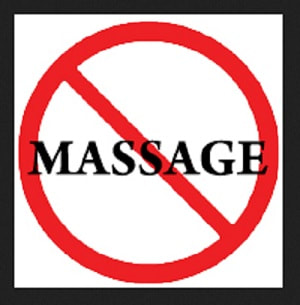- Home
- ABOUT ME
- Peace Positive
-
Peace Positive Massage
- ABOUT / ABOUT ME >
- SERVICES >
- CONTACT >
- GIFT CERTIFICATES
- REVIEWS
-
STRETCHING
>
- The Healing Power of Stretching
- Abdominal Stretches
- Ankle / Foot Stretches
- Arm Stretches
- Back Stretches
- Calf Stretches
- Chest Stretches
- Facial Stretches
- Glute Stretches
- Golfers Elbow
- Hamstring Stretches
- Hand / Wrist Stretches
- Hip Flexor Stretches
- Hunchback Fix
- IT Band Stretches
- Knee Stretches
- Lat Stretches
- Neck Stretches
- Piriformis Stretches
- Plantar Faciitis Stretches
- Psoas Stretches
- QL Stretches
- Quad Stretches
- Rhomboid Stretches
- Rotator Cuff Stretches
- Sciatic Nerve Release
- Shoulder Stretches
- Tennis Elbow
- Trapezius Stretches
- Stretching For Weight Loss
- Full Body Stretching
- INTUITIVE CONSULTATIONS
- BioEnergy Testing
- Contact
- BOOK APPOINTMENT
- ALTERNATIVE NEWS
Contraindications
"Nothing can compare to or replace the healing touch of another human being"
~ Kehrey Anne Dean, LMT, CPMT
~ Kehrey Anne Dean, LMT, CPMT
Reasons why we may NOT massage
What are the Contraindications to Massage Treatment?
Massage treatment is non-invasive, relaxing and natural. It is therefore generally considered a safe treatment for most people.
However, there are three types of contraindication:
These restrictions are put in place to protect your health and well-being. Thank you for taking them as seriously as we do.
Total Contraindications
When you have any of these conditions, please do not book a massage:
Local Contraindications
The therapist can massage but not over any areas affected by:
Medical Contraindications
If you suffer from any of the following conditions, massage can only take place once it has been approved before your session in writing by your Physician.
Does a contraindication mean that treatment cannot take place?
Not always. In fact, massage can be very therapeutic for many medical conditions. However, in the above cases it is best to have advice from your physician. Massage therapists, unless they are also qualified doctors, may not, under law, attempt to diagnose a condition.
If you have further questions or concerns, please contact your physician.
Massage treatment is non-invasive, relaxing and natural. It is therefore generally considered a safe treatment for most people.
However, there are three types of contraindication:
- TOTAL, when massage should not be performed at all.
- LOCAL, when massage can be performed but not over the contraindicated areas.
- MEDICAL, when massage can only be performed once medical permission has been granted.
These restrictions are put in place to protect your health and well-being. Thank you for taking them as seriously as we do.
Total Contraindications
When you have any of these conditions, please do not book a massage:
- Fever
- Contagious diseases, including any cold or flu, no matter how mild it may seem
- Under the influence of drugs or alcohol-including prescription pain medication
- Recent operations or acute injuries
- Neuritis
- Skin diseases
Local Contraindications
The therapist can massage but not over any areas affected by:
- Varicose veins
- Undiagnosed lumps or bumps
- Bruising
- Cuts
- Abrasions
- Sunburn
- Undiagnosed pain
- Inflammation, including arthritis
- Injections
Medical Contraindications
If you suffer from any of the following conditions, massage can only take place once it has been approved before your session in writing by your Physician.
- Cardio-vascular conditions (thrombosis, phlebitis, hypertension, heart conditions)
- Any condition already being treated by a medical practitioner
- Oedema
- Psoriasis or eczema
- High blood pressure
- Osteoporosis
- Cancer
- Nervous or psychotic conditions
- Heart problems, angina, those with pacemakers
- Epilepsy
- Diabetes
- Bell’s palsy, trapped or pinched nerves
- Gynecological infections
Does a contraindication mean that treatment cannot take place?
Not always. In fact, massage can be very therapeutic for many medical conditions. However, in the above cases it is best to have advice from your physician. Massage therapists, unless they are also qualified doctors, may not, under law, attempt to diagnose a condition.
If you have further questions or concerns, please contact your physician.
|
© COPYRIGHT 2023. ALL RIGHTS RESERVED.
|
- Home
- ABOUT ME
- Peace Positive
-
Peace Positive Massage
- ABOUT / ABOUT ME >
- SERVICES >
- CONTACT >
- GIFT CERTIFICATES
- REVIEWS
-
STRETCHING
>
- The Healing Power of Stretching
- Abdominal Stretches
- Ankle / Foot Stretches
- Arm Stretches
- Back Stretches
- Calf Stretches
- Chest Stretches
- Facial Stretches
- Glute Stretches
- Golfers Elbow
- Hamstring Stretches
- Hand / Wrist Stretches
- Hip Flexor Stretches
- Hunchback Fix
- IT Band Stretches
- Knee Stretches
- Lat Stretches
- Neck Stretches
- Piriformis Stretches
- Plantar Faciitis Stretches
- Psoas Stretches
- QL Stretches
- Quad Stretches
- Rhomboid Stretches
- Rotator Cuff Stretches
- Sciatic Nerve Release
- Shoulder Stretches
- Tennis Elbow
- Trapezius Stretches
- Stretching For Weight Loss
- Full Body Stretching
- INTUITIVE CONSULTATIONS
- BioEnergy Testing
- Contact
- BOOK APPOINTMENT
- ALTERNATIVE NEWS
